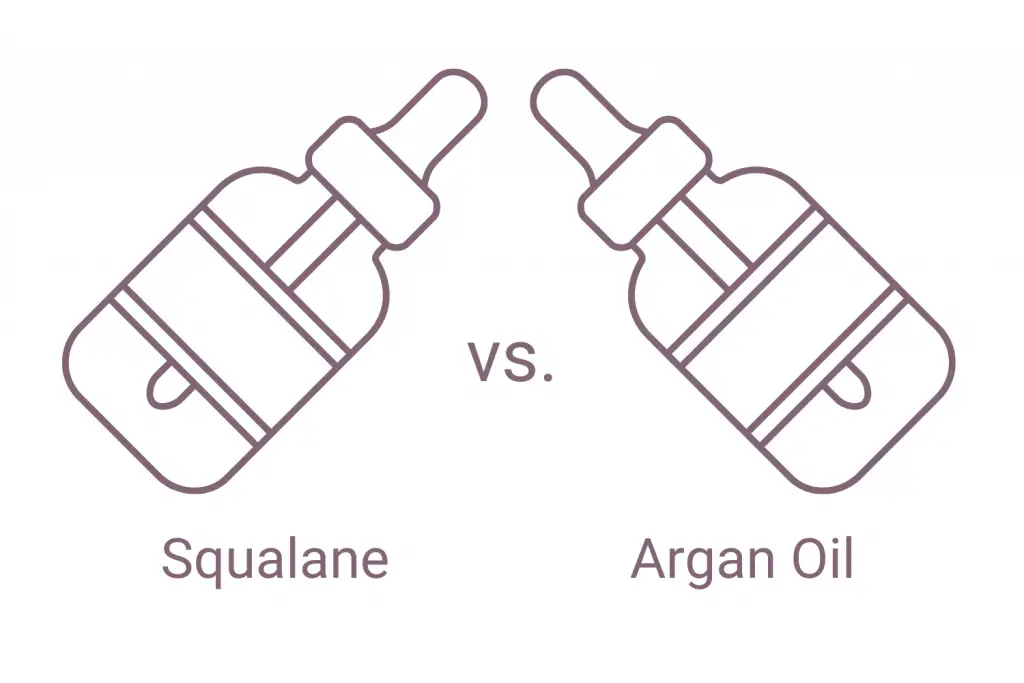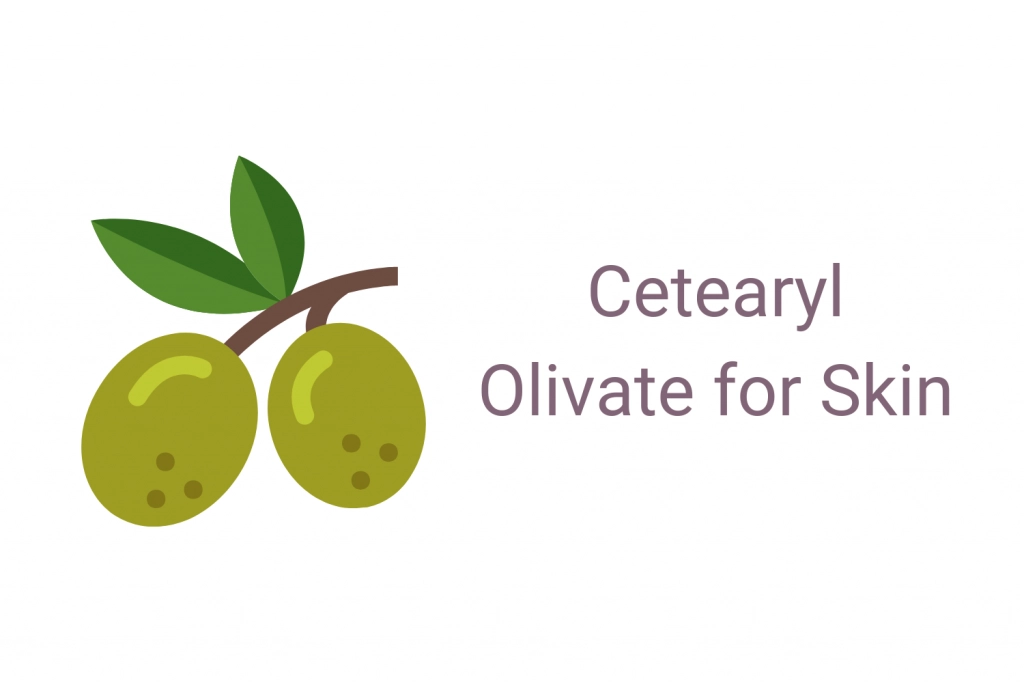Wondering about the differences and similarities between squalane and argan oil and what it could mean for your skincare routine?
This post may contain affiliate links. Read the full disclosure here
When comparing squalane vs. argan oil, which is better? Both ingredients can be derived from plant sources and offer similar benefits. They both offer moisturizing, anti-aging, soothing, and skin-protecting benefits. In fact, argan oil contains squlene as part of its composition.
You can’t go wrong with either argan oil or squalane, but let’s dive into more details for each.
What is squalane?
To better understand what squalane is, it’s necessary to first look at squalene with an “e.” All plants and animals produce squalene. In the human body, this natural oil is found in all tissues, but the skin tends to have a higher concentration of squalane. Roughly 12% of all the squalene in the body is found in the skin. To be more precise, squalene is one of the lipids found in human sebum.
Now back to squalane with an “a.” Squalane is a stable form of squalene that is applied externally to the skin. This is necessary because as we age, squalene production in the body slows down, and the skin loses its softness and becomes drier over time. This can be mitigated by applying squalene derived from animals, such as sharks.
However, because squalene isn’t stable, it must first be converted into squalane through hydrogenation. The good news is that squalane still retains the skin benefits associated with squalene. Hydrogenation converts squalene (an unsaturated oil) into squalane (a saturated oil) with a greater shelf life and the ability to be easily incorporated into skincare products.
See our full guide on the benefits of squalane
Squalane benefits
Squalane provides a wide range of benefits to the skin. It helps moisturize, soften, soothe, protect, reduce the appearance of wrinkles, and more.
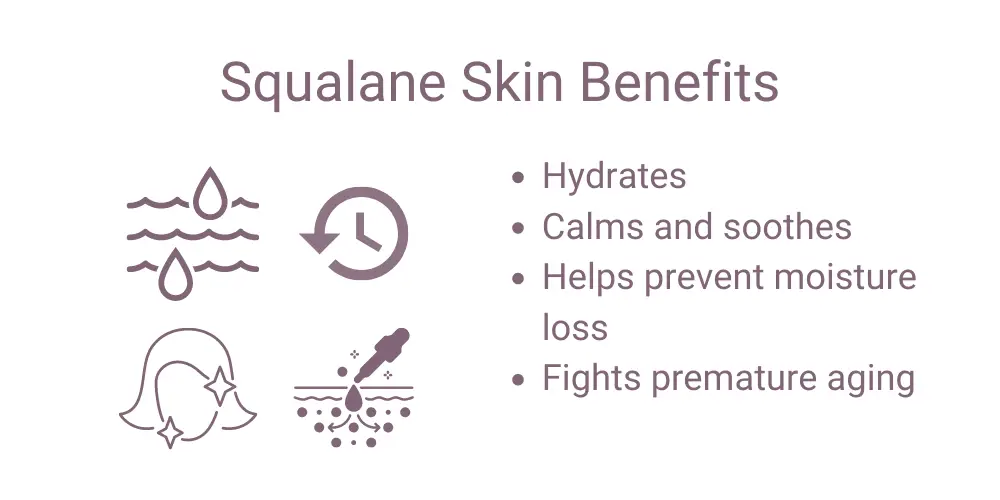
Moisturizes the Skin
Squalane is classified as an emollient or moisturizer. Since it has a chemical structure similar to squalene, the natural oil produced by your own skin, it’s readily absorbed by the skin and has a strong hydrating effect.
Squalane is the perfect lightweight moisturizer because it’s also suitable for oily skin. Therefore, it helps with oil control while also giving the skin a vibrant and luminous appearance. As mentioned, the skin struggles to maintain adequate hydration levels as we age, so applying squalane topically as an external moisturizer boosts the skin’s health.
Softens the Skin
Because squalane helps to keep the skin properly hydrated, using it will also make your skin softer. The antioxidant properties of squalane also impart a smooth texture to the skin. The same antioxidant properties can potentially improve skin tone by reducing the appearance of dark spots, making your complexion even.
Protects the Skin from Sun Damage
Research shows that squalane has powerful antioxidant properties. Antioxidants are an essential ingredient in skincare products designed to slow down the effects of aging. Free radicals are the common culprit when it comes to aging.
The body produces these highly reactive molecules as a result of UV exposure and other external stressors. Free radicals are also a by-product of certain processes in the body. The problem with free radicals is that they damage cells, contributing to aging.
Antioxidants neutralize free radicals, thereby reducing the effects of sun damage.
Reduces the Appearance of Wrinkles
Squalane is also used in anti-aging creams because of its antioxidant properties and because it helps to firm the skin. According to one study, a combination of Vitamin C and squalene boosts the production of collagen.
Collagen is the protein that gives structure to your skin and helps it maintain its elasticity. Since squalane has similar properties to squalene, it also has the potential to keep the skin firm, giving you a more youthful look.
Combats Skin Irritation and Redness
Squalane helps to heal and soothe the skin. Research has shown that this is because of squalane’s anti-inflammatory properties. Therefore, squalane can be beneficial to acne-prone skin since it helps to reduce redness and swelling.
Typically, squalane is a mild and lightweight substance with a gentle effect on the skin, so it’s unlikely to exacerbate redness of the skin. Instead, it minimizes discomfort and lessens the appearance of inflamed areas of the skin.
Squalane is Non-Comedogenic
Squalane has a comedogenic rating of between 0 and 1, meaning it’s suitable for all skin types. The low rating makes squalane a non-comedogenic oil, so it won’t clog the pores. Squalane is a lightweight oil that occurs naturally in the body.
When you apply it to the skin, it penetrates pores without feeling greasy or heavy, unlike some oils. Therefore, those with oily and acne-prone skin can use squalane as a skincare ingredient without worrying about breakouts.
Side Effects of Squalane
There’s very little information related to the side effects that result from using squalane in skincare. This is probably because the body already produces its version of squalane, and applying squalane topically does not trigger any side effects.
It also helps that squalane is a lightweight and stable ingredient, so the skin absorbs it well. In addition, it blends well with other ingredients when incorporated in skincare products.
However, if you’re concerned that your skin might not interact well with squalane, you can always perform a patch test and check for signs of an adverse reaction. If you do have a negative response, don’t hesitate to seek medical help.
While squalane is typically not associated with adverse reactions when used in skincare, the only negatives of using squalane originate from how it’s mainly sourced from deep water sharks and dogfish. This has sparked a lot of controversy from environmentalists and animal rights activists all over the world. Fortunately, plant-based squalane is now being promoted.
Best squalane products
Here are some popular skincare products that contain squalane:
Biossance Squalane + Vitamin C Rose Oil

Squalane is said to be suitable for all skin types, and the fact that it’s lightweight and non-greasy means it blends well with other skincare ingredients. This is why this squalane plus vitamin C rose oil combo could be a great addition to your skincare routine. All in all, this product promises to deliver brightening, hydration, and firming skin benefits.
If you love Biossance, also check out our review on the Biossance Squalane + Phyto-Retinol Serum.
Everyday Beauty 100% Pure Squalane Oil

This product comes in 2 oz and 4 oz bottles and is made from squalane derived from olives. The oil is 100% pure and suitable for face and skin use. Cold-pressed oil is generally said to have more benefits than oil derived through chemical processing since it retains most of its nutrients.
QRxLabs Squalane HA+ Moisturizing Cream

The combination of squalane and hyaluronic acid provides superior hydration and moisturizing benefits and is designed to keep your skin soft and supple. Hyaluronic acid is capable of drawing in moisture from the air, so your skin has all the moisture it needs.
Squalane is one of the most moisturizing oils because it keeps the moisture locked in by strengthening the skin’s protective barrier.
The Ordinary Squalane Cleanser

Squalane is usually available in its pure oil form, but this product has incorporated the ingredient into a cleanser formulation that also works as a makeup remover. This cleanser might work for you if you want a product that’s gentle on your skin. This squalane-based cleanser is soap-free, has a clear oil-like consistency when you rub it in and is designed to not dry out your skin.
More squalane comparison articles you might like:
- Squalane vs. Rosehip Oil
- Squalane vs. Hyaluronic Acid
- Squalane vs. Marula Oil
- Squalane vs. Jojoba Oil
- Squalane vs. Retinol
What is Argan Oil?
Argan oil is an oil extracted from the argan tree, which is indigenous to Morocco. Traditionally, argan oil is used topically on the skin and Moroccan women have long realized its skin benefits.
Argan oil can be extracted from the fruit of the argan tree traditionally, mechanically, or through a solvent. The oil is specifically obtained from the kernels inside the hard-shelled nut after the fruit’s fleshy pulp is peeled away. Typically, the kernels are roasted, ground, and then pressed to obtain the oil.
Chemical Composition of Argan Oil
Argan oil is mainly composed of fatty acids, such as oleic (monounsaturated fatty acid) and linoleic acid (polyunsaturated fatty acid). It also contains palmitic and stearic acids, which are saturated fatty acids.
In one study, the fatty acid profiles of cosmetic argan oil collected from different areas of Morocco were investigated. It showed that the most concentrated fatty acid in argan oil was oleic acid, followed by linoleic acid and then palmitic acid.
It’s also important to note that the lipid profile for argan oil includes squalene. As mentioned, squalene is not only found in high amounts in human skin but also in plants. Besides fatty acids, argan oil contains vitamin E, phenolic compounds, and other skin-beneficial ingredients that make it popular in the skincare industry.
Argan oil benefits
Argan oil also offers worthy benefits to the skin. It helps protect, fight the signs of aging, calms, soothes, moisturizes, and promotes skin repair.
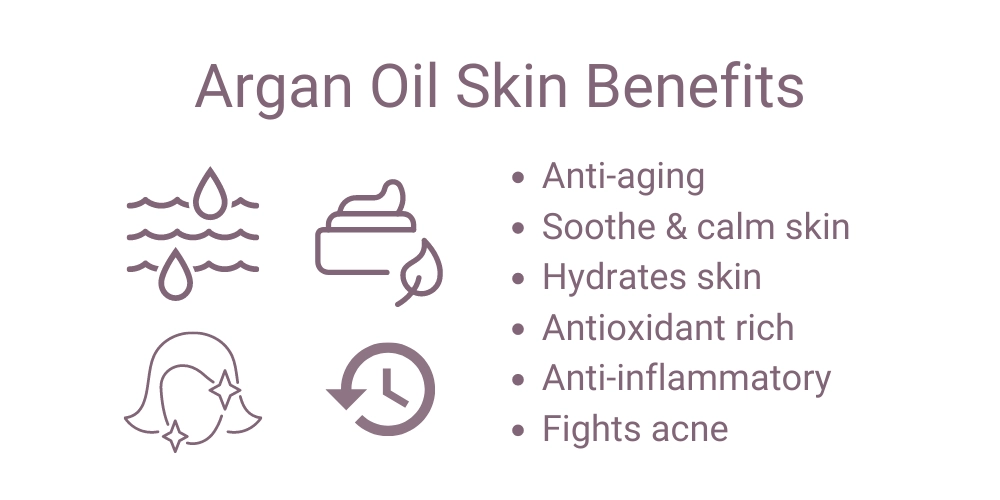
Anti-Aging Effect
Argan oil helps to fight the effects of aging mainly because of its antioxidant properties. As an antioxidant, argan oil combats cellular damage from free radicals produced by sun exposure.
Another way that argan oil improves the youthfulness of the skin is by increasing the skin’s elasticity. This results in firmer skin and the reduction of wrinkles and fine lines.
Treats Inflammatory Skin Conditions
Inflammation can give rise to many skin conditions, such as acne, atopic dermatitis, eczema, psoriasis, and rosacea. Argan oil can help treat the symptoms of these skin conditions mainly because it contains Vitamin E, which has been shown to have anti-inflammatory properties. Overall, argan oil can help reduce redness, irritation, and itchiness of the skin.
For those with naturally oily skin, using argan oil helps to decrease the skin’s oiliness. So, if your skin has an unpleasant oily sheen, you can benefit from argan oil’s anti-sebum effect. In addition, the hydrating and moisturizing properties of argan oil can reduce the severity of inflammatory skin conditions.
Moisturizes the Skin
Research shows that argan oil will keep your skin moisturized when used in skincare. This effect is mainly attributed to the presence of fatty acids in argan oil. Argan oil is rich in linoleic acid, which helps to restore the skin’s barrier. It’s also rich in vitamins A and E, which are well known for their moisturizing properties.
This helps your skin to lock in more moisture, reducing the likelihood of dry skin. Argan oil also works as an excellent moisturizer for dry lips. During colder months, the skin on our lips tends to get chapped and flaky, but applying argan oil overnight might be the solution you need.
Repairs the Skin
Argan oil has antioxidant, anti-inflammatory properties that could make it helpful in repairing skin damage. There are claims that argan oil can help eliminate stretch marks, but so far, there’s no solid scientific evidence to back this up.
However, there could be some truth to this since argan oil improves skin elasticity, which reduces the appearance of stretch marks. Applying argan oil to the skin can also help to reduce the appearance of scarring and hyperpigmentation.
Side Effects of Argan Oil
Argan oil is such a lightweight oil it has a comedogenic rating of 0. This explains why there are no significant side effects associated with argan oil for skincare. However, although the skin can absorb argan oil without it causing aggravation, for the most part, this might not be the case with some sensitive skin types.
External application of oils to sensitive skin always comes with the risk of clogged pores, even when the oil is as mild as argan oil. Therefore, it’s best to seek advice from a medical professional if you have sensitive skin but are interested in adding argan oil to your skincare routine.
Best argan oil products
If you’re wondering where to start shopping for skincare products that contain argan oil, here are our top suggestions:
Kate Blanc Argan Oil 100% Pure
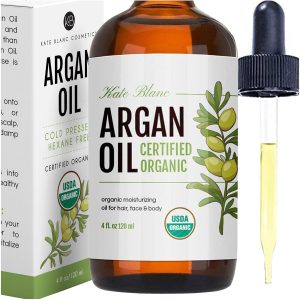
Chances are you’ll love this 2-in-1 product that moisturizes the skin while also repairing dry and damaged hair.
Acure Moroccan Argan Oil

This Moroccan Argan Oil is rich in vitamin E, essential fatty acids, and proteins to hydrate the skin and keep it supple. The argan oil is manufactured through cold-pressing, which helps preserve the integrity of various nutrients and bioactive compounds.
Cliganic USDA Organic Argan Oil

This argan oil has thousands of positive reviews from customers who love this product. There’s even plenty of real customer reviews comparing this oil to the Josie Maran Argan Oil.
Cliganic is one of the leaders in good quality, low-priced all-natural oils. Many of their other options are popular on Amazon as well. They have jojoba oil, rosehip oil, castor oil, tamanu oil, and more.
More Argan oil comparisons you might like:
Squalane vs Argan Oil
Now that we have looked at squalane and argan oil in great detail, let’s consider their main similarities and differences in brief. Which is better for you?
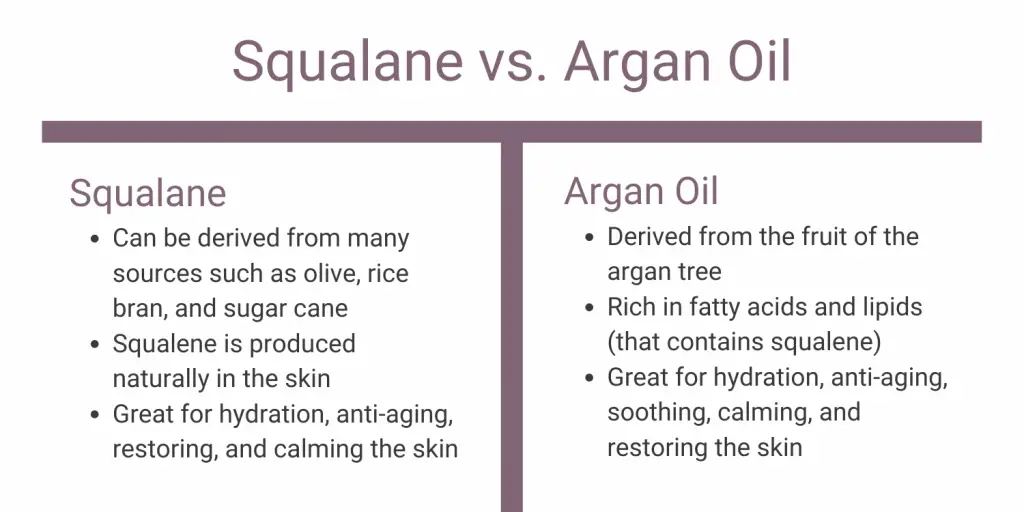
Similarities
Squalane and argan oil play similar roles as skincare ingredients. That’s because argan oil contains squalene, which is the unsaturated version of squalane. Therefore, you’ll find that argan oil and squalane have similar skin benefits. For instance, both oils have moisturizing, hydrating, anti-aging, and antioxidant properties.
Both oils are also classified as non-comedogenic and are hardly associated with any side effects.
Differences
The main difference between squalane and argan oil is that squalane is a fully saturated lipid and hydrocarbon, while argan oil is an extract from the argan tree’s fruit. In addition, argan oil has various components, including squalene, vitamin E, phenolic compounds, and carotenes, which are all associated with several skin benefits.
You may also come across sources that suggest that squalane is 53% better at accelerating cell turnover than argan oil. However, there doesn’t seem to be any existing scientific studies to verify this.
Squalane and Argan Oil Together
Many people often compare squalane and argan oil to figure out which one is the better oil. But, the truth is, both substances have very similar benefits. So, should you use them together?
Well, this is often unnecessary given that argan oil already contains squalene, which is naturally produced in the body. It has been shown that argan oil contains a considerable amount of squalene – about 3140mg/kg.
The only reason why squalane is used as a skincare ingredient instead of squalene is that squalene tends to oxidize quickly when exposed to air. However, you can still enjoy the skin benefits of squalene contained in argan oil.
In conclusion, there may be no need to buy separate squalane oil if you already have argan oil as part of your skincare routine, unless you believe that using squalane and argan oil together enhances the effect you’re looking for. Still, you’ll be hard-pressed to find a skincare product that specifically contains this combo as active ingredients.

